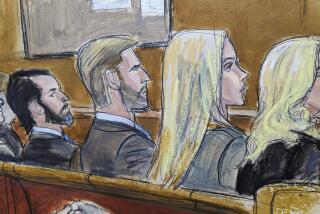In the End, the Publicity Doesn’t Matter
Give me a day off from the O.J. Simpson trial and what do I do? Go to the Heidi Fleiss trial.
I know it’s crazy. Possibly the asbestos and other foul substances floating around the crumbling Criminal Courts Building have affected my mind. But it seemed like a good idea Monday to check out Los Angeles’ other media-saturated courtroom encounter. I thought I might learn something and, as it turned out, I did.
What I got was a frank view of how publicity affects the jury process, an insight that applies even more to the much more heavily publicized Simpson trial.
*
It came from Deputy Dist. Atty. Alan Carter as he began his final arguments for conviction of Fleiss, the alleged Hollywood madam on trial for pandering and possession of cocaine for sale.
The next day, the jurors would go behind closed doors in the jury room and begin the deliberations that will determine Fleiss’ fate.
Most of them took notes on steno pads and listened intently. Reporters looked at them for smiles, twitches or frowns that would betray their feelings. For the most part, the jurors’ faces were impassive. I watched two women jurors talk and exchange knowing glances but had no idea what it meant.
Carter had a deceptively tough style as he sought to connect with these unsmiling faces. It was in sharp contrast to his opponent, Fleiss lawyer Anthony Brooklier, who was dapper in a well-cut, dark blue, double-breasted suit, white shirt and dark tie. Carter, a former Alameda County sheriff’s deputy, came across as a rough-at-the-edges street lawyer, suit coat unbuttoned, shirt looking a bit wrinkled.
His manner was as rumpled as his attire. Once, I’d have thought this was just how Carter dressed and acted. But after hanging around the courts since summer, I’m more cynical and figure this may be the prosecutor’s way of identifying with a jury that looked as though it was from Los Angeles’ middle-class.
My insight into jury behavior came when Carter called the jurors’ attention to the reporters and camera people who occupied a substantial portion of the small courtroom. He told them that “even subconsciously, you may be affected in some way by the attention being paid to this case.”
In other words, the jurors’ perception of the Fleiss trial is changed because the event is so highly publicized. It’s as though you happened upon a building fire covered by five television stations. The presence of all the TV crews would make the fire a bigger event in your mind, telling you that it’s really important.
As I listened to Carter, I thought about how this applied to the Simpson trial.
Superior Court Judge Lance A. Ito has made painstaking efforts to shield Simpson jurors from news of the trial. From what he has said, it sounds as though the jury will be sequestered once the trial begins. That means they’ll be living in hotel rooms, apart from family and friends, for as much as six months, a tedious existence Ito hopes to relieve with family visits, Disneyland trips and other activities.
Yet for all his precautions, Ito will not be able to shield the jurors from the knowledge that they’re part of an extended drama that will be watched throughout the United States and in other countries.
I talked to a highly regarded Los Angeles trial lawyer on Tuesday who said that none of this matters.
I had first talked to him several weeks ago when he called to say he agreed with a column I’d written on how the Simpson case lawyers were treating prospective jurors with considerable disrespect. “What I’ve observed is that most lawyers and most judges have contempt for juries,” he said at the time. “They think jurors are stupid.”
A rare bird, indeed, he is one of the few L.A. lawyers who doesn’t want to be quoted on the Simpson case. So I said I wouldn’t use his name.
We discussed the factors that shape jurors’ opinions.
Despite the judge’s admonitions, jurors can’t avoid the outside world, he said. “You read it in the paper,” he said, “but you’re supposed to be grown-up enough to know that everything in the paper isn’t true.
“I know the judge tells them they can’t discuss the case,” he said. “But human nature being what it is, you (a juror) begin forming opinions when the trial begins. You are accumulating impressions, and I don’t think the law tells you you are not supposed to form impressions.
“What the court tells you is that you are supposed to keep an open mind as you start your deliberations. . . . Evidence comes in a piece at a time and what comes in earlier may be changed by later developments.”
Once deliberations start, he said, the verdict “should be a collective opinion. You have impressions, but you don’t make up your mind until you hear what the other jurors have to say.”
Inside the jury room, there’s lots of back-and-forth. “Jurors have told me that other jurors have pointed out to them things they’ve ignored.”
*
In the end, the lawyer said, good sense usually prevails. “I really do trust juries,” he said. “I am of the opinion that in this kind of activity, you do not need to be a lawyer or a Ph.D. to distinguish between truth and falsehood, justice and injustice. Most people, white-collar and blue-collar, want to do the right thing.”
The lesson of the Fleiss trial is the impact of publicity can’t be avoided. But as my lawyer friend said, it doesn’t matter.
More to Read
Sign up for Essential California
The most important California stories and recommendations in your inbox every morning.
You may occasionally receive promotional content from the Los Angeles Times.










